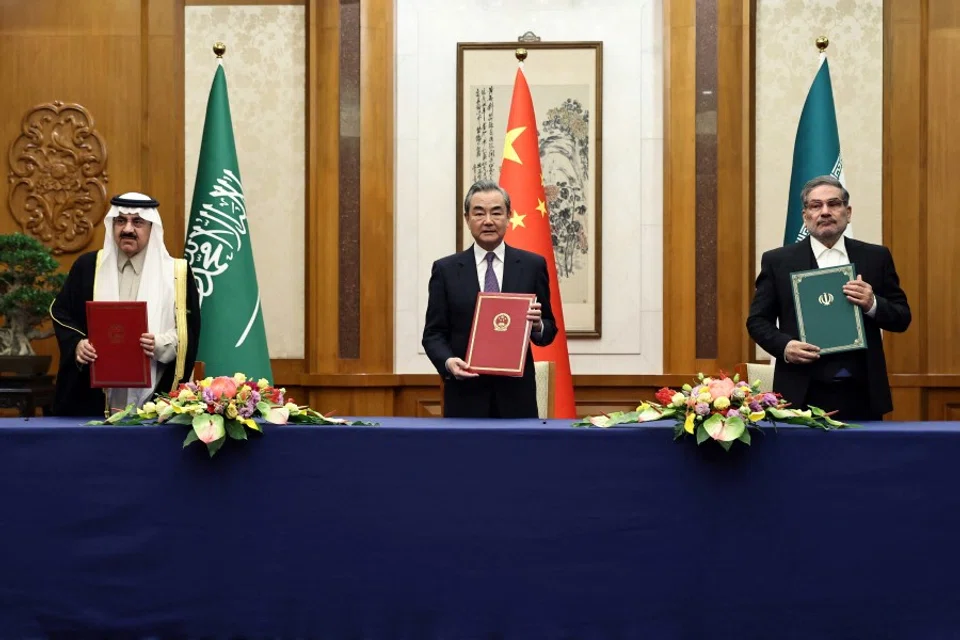Differences between the US and China in Middle East peace advocacy
China's success in mediating peace between long-term rivals Saudi Arabia and Iran has highlighted the major power's role as a key player in security in the Middle East. While some international media take it as a sign of China's ambitions, academic Fan Hongda feels that the peace deal has addressed a common need for all parties, and China has its own way of promoting peace in the region.

On 10 March, with the unexpected release of the Joint Trilateral Statement by the People's Republic of China, the Kingdom of Saudi Arabia, and the Islamic Republic of Iran, news immediately spread around the world that Saudi Arabia and Iran have reached an agreement in Beijing with China's mediation to resume diplomatic ties.
While long-term rivals Saudi Arabia and Iran's agreement to resume diplomatic ties, which were severed in early 2016, made headlines, it was the fact that the two nations had signed the agreement in Beijing with China's mediation, including the resumption of diplomatic relations within two months, that shocked international media.
This may seem incredible, but advocating peace in the Middle East has always been an important part of China's diplomacy in the region.
Addressing a common need
Advocating peace among Middle East nations fairly and based on the principle of international law has been a prominent feature of China's diplomacy in the region. China has also been painstakingly exploring the means and opportunities to promote security in the Middle East, as well as conveying that it is willing to assist Middle East nations to fulfill the desire for regional security.
China's balanced diplomacy in the Middle East will encounter increasing challenges if the serious confrontation between some Middle Eastern countries, especially the regional powers, is not eased.

At the same time, Middle East nations have increasingly looked to China to do more to help them address the problems of regional security. These have led to increasingly greater consensus in cooperation between China and Middle East nations on security concerns, especially since Chinese President Xi Jinping publicly proposed the Global Security Initiative in April 2022.
Indeed, China would prefer a more peaceful Middle East. China's balanced diplomacy in the Middle East will encounter increasing challenges if the serious confrontation between some Middle Eastern countries, especially the regional powers, is not eased.
This was very clearly illustrated in the widespread controversy caused by the release of three documents: the Joint Statement Between the People's Republic of China and the Kingdom of Saudi Arabia, and the Statement of the Riyadh Summit for Cooperation and Development between the Gulf Cooperation Council and the People's Republic of China, both issued during President Xi's visit to Saudi Arabia in December 2022; and the Joint Statement between the People's Republic of China and the Islamic Republic of Iran, issued during Iranian President Ebrahim Raisi's visit to China in February 2023.
Furthermore, merely emphasising economic and energy cooperation is increasingly inadequate in further deepening relations between China and Middle East nations, especially the powers in the region. Therefore, China's help to address the security challenges in the Middle East is also necessary for the relationship to deepen further.
Regarding the face-to-face meeting between the high-level security delegations of Saudi Arabia and Iran in Beijing, both nations are friendly to China and have a strong desire to resume diplomatic ties. They have had several rounds of direct talks with the help of Iraq and Oman since April 2021 and resolved many difficulties that have plagued Saudi-Iranian bilateral relations.
... unlike claims by some international media that China's mediation of Saudi-Iran relations is a reflection of China's ambition, it is a common need of the parties involved.

Under these circumstances, when requested to help mediate between Saudi Arabia and Iran, China readily agreed and made inroads into the matter. Therefore, unlike claims by some international media that China's mediation of Saudi-Iran relations is a reflection of China's ambition, it is a common need of the parties involved.
Of course, while the signing of the agreement between Saudi Arabia and Iran is merely a good start, its successful implementation is more crucial. Saudi-Iranian disputes are deep-seated, and there remain some global factors that are unconducive to the Saudi-Iranian detente. Hence, the tripartite communication in Beijing is very likely to secure some safeguards for the resumption of Saudi-Iranian diplomatic ties. China is an official party to this and together with Saudi Arabia and Iran issued a trilateral statement on 10 March. Evidently, China will closely follow the progress of the resumption of Saudi-Iranian diplomatic ties.
China advocates peace in the Middle East through development, while the US seeks peace in the Middle East by keeping hostile or unfriendly nations in check.
Differences between the US and China
I noticed that the mainstream international opinion regarding China's mediation between Saudi Arabia and Iran is positive and affirmative. However, it has also been interpreted, especially by some US experts, as a sign of China's "ambitions" in the Middle East that demonstrates China's ability to challenge the US and warrants the US to take China more seriously.
Objectively, both the US and China accord importance to security in the Middle East but their corresponding policies differ greatly. China advocates peace in the Middle East through development, while the US seeks peace in the Middle East by keeping hostile or unfriendly nations in check. For example, during the Trump administration, Washington vigorously encouraged some Middle East nations to form a bloc against Iran.
As Middle East nations have increasingly emphasised economic development, the better partner is one that can drive better development. China has so far responded better to their economic development needs, and its concept of peace in the Middle East is certainly more popular with the people there. It is also important to note that Middle East nations, especially the powers in the region, have become increasingly autonomous in domestic developments and external relations.

Nevertheless, I still believe that the strength and global attractiveness of the US remain unsurpassed by other nations, and that it has a remarkable ability to make policy adjustments. Therefore, unlike some international observers, I frankly do not view China's success in its mediation between Saudi Arabia and Iran as another sign of declining US power.
Without their goodwill and request, I doubt that China would offer assistance without being asked, because it is not China's practice to participate without an invitation.
Finally, let us look at some of the outcomes of China's mediation diplomacy. The Houthis in Yemen have made rather friendly overtures to Saudi Arabia. Ali Shamkhani, secretary of the Supreme National Security Council of Iran, who has just concluded negotiations in Beijing on normalising relations with Saudi Arabia, visited the United Arab Emirates on 16 March for talks on bilateral, regional and international issues. The Maldives has also announced that it will resume diplomatic ties with Iran. Evidently, China's mediation diplomacy has been very successful so far.
The signing of the agreement in Beijing by Saudi Arabia and Iran to resume diplomatic ties will certainly raise global expectations of China, which also hopes to continue to contribute positively to regional and world peace.
If parties in the Middle East or elsewhere involved in conflicts have a strong desire to resolve their differences and want China's assistance, I believe China will do its best to help. However, China's good intentions require proactive cooperation from the parties concerned. Without their goodwill and request, I doubt that China would offer assistance without being asked, because it is not China's practice to participate without an invitation.
Related: China's entry into the Middle East: Beginning of China-US full-scale confrontation | Xi's Saudi visit: Middle powers uniting in a hierarchical world | Will China become an 'empire by invitation' in the Middle East? | Chinese academic: Beijing does not want China to replace the US in the Middle East





![[Photos] Fact versus fiction: The portrayal of WWII anti-Japanese martyrs in Taiwan](https://cassette.sphdigital.com.sg/image/thinkchina/3494f8bd481870f7c65b881fd21a3fd733f573f23232376e39c532a2c7593cbc)